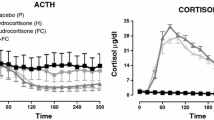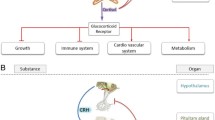Abstract
In the present work the possible use of loperamide, an opiate agonist, in the dynamic evaluation of patients with suspected hypercortisolism was investigated. The effects of loperamide on plasma ACTH and Cortisol levels were evaluated in normal subjects and in 58 patients with suspected Cushing’s syndrome. The results were compared to those obtained after the overnight dexamethasone suppression test. In normal subjects plasma ACTH and Cortisol levels were significantly (p < 0.005) suppressed by both loperamide (16 mg po) and dexamethasone (1 mg po). In 17 patients, in whom the diagnosis of Cushing’s syndrome was confirmed by subsequent investigations, neither loperamide or dexamethasone inhibited Cortisol (from a baseline of 606 ± 55 nmol/L) to a nadir of 502 ± 43 nmol/L and 539 ± 50 nmol/L, respectively) and ACTH concentration (from a basal level of 70.1 +11.8 pg/ml to a nadir of 46.0 ± 8.6 pg/ml and 54.3 ± 7.5 pg/ml, respectively). In 34 patients, in whom the suspect of hypercortisolism was ruled out, either loperamide or dexamethasone suppressed the pituitary-adrenal axis: Cortisol and ACTH levels significantly fell from 417 ± 24 nmol/L and 28.3 ± 3.5 pg/ml to 60 ± 6 nmol/L and 14.4 ± 1.4 pg/ml after loperamide and to 26 ± 4 nmol and 16.4 ± 1.7 pg/ml after dexamethasone. In 7 patients discordant responses were observed. In 3 patients treated with antiepileptic drugs ACTH and Cortisol levels were inhibited by loperamide, but not by dexamethasone. In 4 other patients a normal suppression was induced by dexamethasone, but not by loperamide: in 2 cases the suspected hypercortisolism was definitely ruled out while in the other two no definitive diagnosis could be established. In these series of patients, the loperamide test equals the 1 mg dexamethasone suppression test in terms of sensitivity, specificity, diagnostic accuracy and predictive value. In conclusion: i) Loperamide administration is practical and reliable in testing the pituitary-adrenal function; ii) The procedure needs only three and half h to be completed and thus it is suitable and compliant to outpatients; iii) Loperamide might be useful in patients in some conditions (drug interference), in which the low-dose dexamethasone test has some limitations.
Similar content being viewed by others
References
Stubbs W.A, Delitala G., Jones A., Jeffcoate W.J., Edwards C.R.W., Ratter S.J., Besser G.M., Bloom F.R., Alberti K.G.M.M. Hormonal and metabolic responses to an enkephalin analogue in normal man. Lancet 2: 1225, 1978.
Del Pozo E., Von Graffenried B., Brownell J., Derrer F., Marbach P. Endocrine effect of a methionine-enkephalin derivative (FK 33–824) in man. Horm. Res. 13: 90, 1980.
Gaillard R.C., Grossman A., Smith R., Rees L.H., Besser G.M. The effects of a met-enkephalin analogue on ACTH, β-LPH, β-endorphin and met-enkephalin in patients with adrenocortical disease. Clin. Endocrinol. (Oxf.) 14: 471, 1981.
Allolio B., Winkelmann W., Hipp F.X., Karlen D., Mies R. Effects of a met-enkephalin on adrenocorticotropin (ACTH), growth hormone and prolactin in patients with ACTH hypersecretion. J. Clin. Endocrinol. Metab. 55: 1, 1982.
Ambrosi B., Bochicchio D., Faglia G. Loperamide, an opiate analogue, inhibits plasma ACTH levels in patients with Addison’s disease. Clin. Endocrinol. (Oxf.) 24: 483, 1986.
Ambrosi B., Bochicchio D., Riva E., Faglia G. Influence of loperamide on ACTH, GH and PRL levels in patients with ACTH hypersecretion. Acta Endocrinol. (Kbh.) 256(Suppl. 256): Abs. 201, 1983.
Deuss U., Allolio B., Kaulen D., Fischer H., Winkelmann W. Effects of high-dose and low-dose naloxone on plasma ACTH in patients with ACTH hypersecretion. Clin. Endocrinol. (Oxf.) 22: 273, 1985.
Allolio B., Deuss U., Kaulen D., Leonhardt U., Kallabis D., Hamel E., Winkelmann W. FK 33–824, a met-enkephalin analog, blocks Corticotropin-Releasing Hormone-induced Adrenocorticotropin secretion in normal subjects but not in patients with Cushing’s disease. J. Clin. Endocrinol. Metab. 63: 1427, 1986.
Baranowska B., Dorobek W., Misiorowski W., Jeske W., Abdel-Fattah M.H. The effect of naloxone on ACTH and β-endorphin in patients with Cushing’s disease. Acta Endocrinol. (Kbh.) 110: 170, 1985.
Mackerer R.C., Clay G.A., Dajani E.Z. Loperamide binding to opiate receptor sites of brain and myenteric plexus. J. Pharmacol. Exp. Therap. 199: 131, 1976.
Bochicchio D., Ambrosi B., Faglia G. Loperamide, an opiate analog, differently modifies the ACTH responses to CRH and Lysine-vasopressin in patients with Addison’s disease. Neuroendocrinology 48: 611, 1988.
Galen R.S., Gambino S.R. Beyond Normality: The Predictive value and Efficiency of Medical Diagnoses. John Wiley & Sons, New York, 1975.
Tolis G., Jukier L., Wiesen M., Krieger D.T. Effect of naloxone on pituitary hypersecretory syndromes. J. Clin. Endocrinol. Metab. 54: 780, 1982.
Caro J.F., Meikle A.W., Check J.H. “Normal suppression” to dexamethasone in Cushing’s disease: an expression of decreased metabolic clearance for dexamethasone. J. Clin. Endocrinol. Metab. 47: 667, 1978.
Crapo L. Cushing’s syndrome: a review of diagnostic tests. Metabolism 21: 955, 1979
Allolio B., Winkelmann W., Kaulen D., Reincke M., Jaursch-Hancke C., Schrell U., Fahlbusch R. A reversible defect in the opioidergic control of ACTH release in Cushing’s disease. In: Landolt A.M., Heitz P.U., Zapf J., Girard J., Del Pozo E. (Eds.), Advances in pituitary adenoma research. Pergamon Press, Oxford, 1988, p. 349.
Author information
Authors and Affiliations
Rights and permissions
About this article
Cite this article
Ambrosi, B., Bochicchio, D., Ferrario, R. et al. Effects of the opiate agonist loperamide on pituitary-adrenal function in patients with suspected hypercortisolism. J Endocrinol Invest 12, 31–35 (1989). https://doi.org/10.1007/BF03349913
Received:
Accepted:
Published:
Issue Date:
DOI: https://doi.org/10.1007/BF03349913




